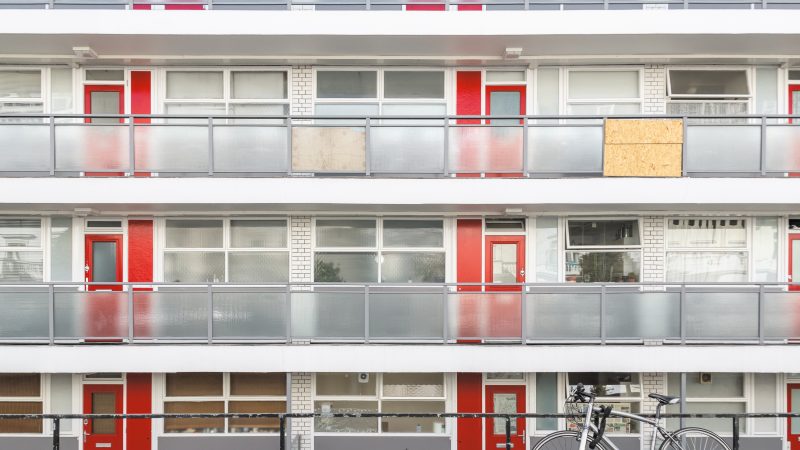
The housing crisis is one of the biggest challenges faced by this country, threatening wellbeing and prosperity. Around a third of British adults do not have access to a safe and secure home. This rises to 58% of single-parent households, 57% of Black adults and 54% of disabled adults. Features of the crisis include:
- Low affordability. Home ownership has become increasingly out of reach for young people who are half as likely to own a home as the previous generation.
- Poor quality homes. Around 17% of all houses in England are ‘non-decent’.
- Widespread discrimination. Disabled adults are nearly six times more likely than non-disabled adults to report experiencing discrimination when looking for a home, while Black and Asian adults are nearly four times more likely than white adults to do so.
- Significant insecurity. Short-term tenancies and no-fault evictions create distress and powerlessness and contribute to a high number of moves within the private rented sector.
These challenges affect all parts of the country in different ways. The housing crisis is most associated with London, where house prices were 14.7 times earnings in 2019. On average, private renters spend 42% of their household income on rent in the city. But rural areas also face affordability challenges, with house prices in 2019 reaching 8.6 times earnings in ‘predominately rural’ areas.
In smaller cities and non-metropolitan towns outside of London and the South East, housing costs are usually lower but poor quality housing is a real challenge, especially in the private rented sector. Places like Blackpool, Hartlepool and Stoke-on-Trent have a larger proportion of houses lying empty for more than six months longer than the national average. And in coastal communities, poor quality and multi-occupancy accommodation contributes to adverse health outcomes.
Tackling this crisis, and its complex and interrelated problems, requires an inclusive vision and policies tailored for different places and their challenges. No place can be left out, and no one can be left behind. Labour’s housing policies must be ambitious and comprehensive, drawing together several government departments to coordinate reform of social security, taxation policy and support to first-time buyers, for example.
Social housing must sit at the heart of this agenda. It is perhaps the most effective intervention in our housing markets, providing genuinely affordable, secure and good-quality homes on the scale required to make a difference to millions. This cannot be a top-down, centralised approach; devolved and local government should be partners in the UK’s government’s objectives and meeting the need to deliver at scale.
Labour must demand the very best quality homes for new and existing social housing. Homes must meet the needs of those who live there, with accessibility for disabled and older people, and access to green spaces. They must help meet carbon reduction targets, including taking advantage of green technologies and retrofitting. Labour must use social housing to set standards that the entire housing market must meet to ensure everyone can live in a home worthy of the name.
To deliver change, Labour needs to win power – and to win power, Labour’s housing policies must speak to people’s priorities and concerns. The party cannot simply announce housebuilding targets alone. Any future housebuilding programme must be ambitious to tackle the scale of the challenge our country faces, but it is the vision of how we can all live well together, free from housing insecurity, that will win votes.
That means changing perceptions that have been with us for decades. Social housing is often seen as a ‘safety net tenure of last resort’. It has not seemed relevant for most of the country, largely because there have not been enough homes for anyone but the poorest households. Labour must make a new, broader case for social housing.
Social housing could help hundreds of thousands of older people who are currently renting privately but fear they will find it unaffordable as rents rise and their income does not. It could help aspiring young homeowners save more for a deposit by cutting the cost of rent and helping them get on the housing ladder quicker. It can provide greater housing security so that people can get on with their lives, whether that’s raising children or starting a business. It can help people stay close to family and vital support networks instead of being forced away. It can help people put down roots and participate in community life.
Social housing could provide homes for a wide range of people – some for their entire lives, some only for a short while, and others never using it but knowing it is there if required. Social housing can appeal to every part of our country, from London to our smallest villages, from our post-industrial towns to our commuter belts, and from Labour’s heartlands to places that turned away from us in 2019 or even earlier.
Housing affects all parts of the country in different ways, and this agenda can be just as appealing in coastal or rural target seats that Labour has never won, as it is in the major cities where the party currently dominates. An ambitious and inclusive social housing policy offers the best chance to tackle the housing crisis and the harm it causes to our communities, especially Black and ethnic minority, disabled and low-income families. Labour’s vision should draw from its ideals, applied to the housing challenges of today. And in doing so, a Labour government can deliver on its promise to make Britain “the best place to grow up and grow old in”.
This is an edited version of an essay that first appeared in a pamphlet, ‘Home Front’, published by the Fabian Society and Shelter.




More from LabourList
‘Energy efficiency changes must work for older private renters’
‘Labour’s creative destruction dilemma’
Economic stability for an uncertain world: Spring Statement 2026